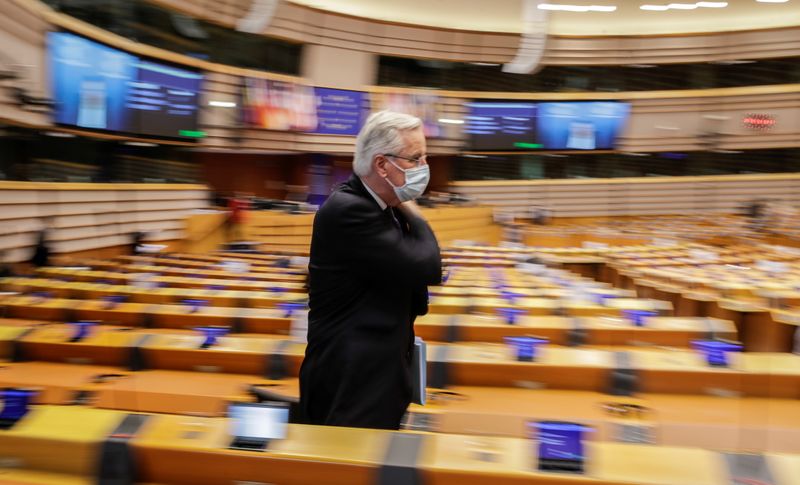By Kate Abnett and Elizabeth Piper
BRUSSELS/LONDON (Reuters) - Britain reiterated on Saturday that it would prefer to leave the European Union with no trade deal rather than compromise its independence while there was no word from Brussels on whether progress had been made after a crucial day of talks.
With less than two weeks before Britain leaves the EU's orbit, both sides are calling on the other to move to achieve a breakthrough and safeguard almost a trillion dollars worth of trade from tariffs and quotas.
"We need to get any deal right and based on terms which respect what the British people voted for," said a UK government source.
"Unfortunately, the EU are still struggling to get the flexibility needed from member states and are continuing to make demands that are incompatible with our independence."
Since Britain left the EU in January, the talks have been largely hamstrung over two issues - the bloc's fishing rights in British waters and creating a so-called level playing field providing fair competition rules for both sides.
There is little time left. Both sides need to get any deal approved by their parliaments, and with the talks in their final stages, it is expected that any conclusion will most likely come before Christmas.
EU Brexit negotiator Michel Barnier said on Friday that "just a few hours" remained to reach a post-Brexit trade deal. He cited "extremely difficult" negotiations over how the EU could retaliate if Britain back-pedalled on production standards to win a competitive edge for its products, or if Britain cut European fishermen off from its fishing waters in the future.
The European Parliament on Saturday repeated its call for a deal to be reached no later than this weekend, to give it time to properly ratify the agreement.
David McAllister, head of the parliament's Brexit group, said the chamber could hold an emergency plenary on Dec. 29 if a deal was struck no later than this weekend.
"This requires that on Sunday evening at the latest we get a text, in order to start our prepared measures and work," he told German broadcaster NDR.
The EU has long said it wants to safeguard the parliament's right to exercise democratic oversight by voting on any deal sealed by the EU and UK negotiators.

However, if a deal arrived later than this weekend, the 27 EU member states could still endorse it on their own to allow for "provisional application", a scenario that would be likely to upset European lawmakers.
(additional reporting by Joseph Nasr in Berlin; Editing by Catherine Evans and Christina Fincher)